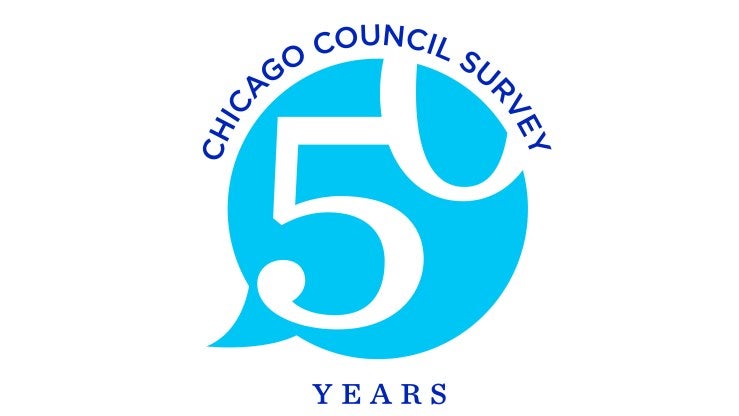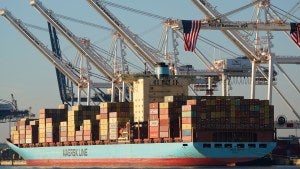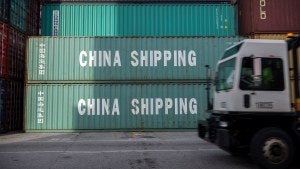Pandemic-era shortages seem to have strengthened the public's appetite for greater economic self-sufficiency.
Over the past 10 years, US trade policy has undergone a significant reorientation. While global free trade was once a core component of US foreign policy, unabashed industrial policy—with its focus on self-sufficiency, massive subsidies, and anointed industries—is now in vogue. The US public is of two minds when it comes to US trade policy. Americans of all political stripes see the benefits of international trade for both the US economy and for their own standard of living. But the shortages of the COVID-19 pandemic strengthened appetites for greater economic self-sufficiency. Even as Americans support international trade, there is broad support for restricting that trade in order to protect American jobs. This puts the public in a well-known position—American politicians are trying to perform that same balancing act.
Key Findings
- Three-quarters of Americans (75%) say international trade is good for the US economy, 81 percent say it is good for consumers like themselves, and 81 percent say it is good for their standard of living.
- The effects of trade on domestic job creation is a partisan dividing line. While a slim majority of Republicans (52%) say international trade is bad for job creation in the United States, 69 percent of Democrats say it is good for creating jobs at home.
- Despite positive views of free trade, there is strong support for some restrictions. Two-thirds of Americans (66%) say US trade policy should have restrictions on imported foreign goods to protect American jobs.
- A plurality of Americans (41%) prefer the United States reduce international trade and seek greater self-sufficiency in all areas. This includes a majority of Republicans (55% vs. 20% global free trade). A plurality of Democrats instead prefer a global free trade policy (43% vs. 31% self-sufficiency).
Americans Take Positive View of International Trade
In 2024, Americans are overwhelmingly positive about international trade. Three-quarters (75%) say it is good for the US economy, 81 percent say it is good for consumers like themselves, 81 percent site it as good for their standard of living, and 58 percent see it as good for creating jobs in the United States
However, attitudes on the latter form a critical divide between Republicans and Democrats. While nearly seven in 10 Democrats (69%) say international trade is good for job creation in the United States, a slim majority of Republicans (52%) say it is bad for job creation at home.
For much of the past 70 years, the Republican Party was viewed as staunch free traders while Democrats were noted for their focus on the effects of free trade on domestic labor. The Republican Party’s fervor for free trade has since cooled but this has had little effect on the Republican public’s positive views of international trade. On each of the four response options included in the survey, positive views of Republicans have increased between four and 10 percentage points since this question was first asked in 2004.
But the Democratic public has undergone a dramatic shift in its views of international trade. For each response option included in the survey, positive views among Democrats have increased between 12 and 31 percentage points since 2004. The most dramatic shift has been toward the effects of international trade on creating jobs in the United States. In 2004, 38 percent of Democrats said it was good for domestic job creation. In 2024, that now stands at 69 percent.
For both Republicans and Democrats, the Trump administration brought boosts to positive views of international trade. But those increases likely occurred for different reasons. For Republicans, Trump took a tougher line on trade, in particular with regard to China, likely leading to a view that international trade coupled with tariffs and protectionist policies meant an improved form of trade. For Democrats, the protectionist policies of the Trump administration may have sparked what they perceived as a corrective call for more and freer international trade, not less, thus emphasizing free trade’s benefits.
As positive views of the effects of international trade have increased, so too have positive views of how those benefits are divided between the United States and its trade partners. In 2024, 63 percent of Americans—up from 50 percent in 2017—say trade between the United States and other countries benefit both the United States and other countries. Just 23 percent say it mostly benefits other countries, 9 percent say it mostly benefits the United States, and only 4 percent says it benefits neither.
Despite Positive Views of Free Trade, Industrial Policy Draws Ample Support
Even though a broad section of the American public sees the myriad benefits of trade, there is also broad support for restricting that trade when it is put in the context of protecting American jobs. Since 1974, when this question was first asked, roughly 80 percent consistently cite protecting the jobs of American workers as a very important goal of US foreign policy.
In 2024, when offered a choice between placing restrictions on imported foreign goods to protect American jobs or have no restrictions to enable consumers to have the most choices and the lowest prices, two-thirds of Americans (66%) favor restricting the import of foreign goods. This is an area of strong bipartisan agreement: 77 percent of Republicans and 63 percent of Democrats are in favor of those restrictions. This, despite majorities of Democrats (69%) and 47 percent of Republicans saying international trade was good for creating jobs in the United States.
Following the COVID-19 pandemic, the search for secure supply chains has become a key pillar in successive presidential administrations. Of course, this often runs directly counter to the tenets of free trade that led to the distributed production process. Those globalized supply chains allowed products to be produced at lower costs even if that meant increasingly complex supply chains that were more difficult to navigate or circumvent in an emergency. The COVID-19 pandemic was just such an emergency. The pandemic-era shortages in critical supplies such as protective equipment and semiconductors experienced by the American public—and the subsequent messaging from Republican and Democratic presidents—seem to have struck a chord with many Americans.
When asked what kind of trade policy the United States should pursue, a plurality of Americans (41%) prefer to reduce international trade and seek greater self-sufficiency in all areas. Thirty-five percent favor pursuing a policy of global free trade, and two in 10 (20%) say Washington should create a trade bloc of friends and partners while excluding other nations.
However, Republicans and Democrats disagree on which of these broad policies the United States should pursue. A majority of Republicans (55%) prefer greater self-sufficiency and reduced international trade, compared to three in 10 Democrats (31%). Meanwhile, a plurality of Democrats (43%) want to pursue global free trade, while only one in five Republicans agree (20%).
Conclusion
Americans on the whole are broadly supportive of free trade and are aware of the benefits it brings to the country and to their own lives. But they seem to want it both ways: reaping the benefits of international trade while at the same time placing restrictions on that trade to protect American jobs. It is unclear how well those two things can co-exist. The allure of greater self-sufficiency is not likely to abate in the near future. However, the willingness to pay higher prices for goods in what has already been an inflationary period will be the real litmus test moving forward.
This analysis is based on data from the 2024 Chicago Council Survey of the American public on foreign policy, a project of the Lester Crown Center on US Foreign Policy. The 2024 Chicago Council Survey was conducted June 21-July 1, 2024 by Ipsos using its large-scale nationwide online research panel, KnowledgePanel, in both English and Spanish among a weighted national sample of 2,106 adults aged 18 or older living in all 50 US states and the District of Columbia. The margin of sampling error for the full sample is ±2.3 percentage points including a design effect of 1.1229. The margin of error is higher for partisan subgroups or for partial-sample items.
Partisan identification is based on how respondents answered a standard partisan self-identification question: “Generally speaking, do you think of yourself as a Republican, a Democrat, an Independent, or what?”
The 2024 Chicago Council Survey is made possible by the generous support of the Crown family, the Korea Foundation, and the United States-Japan Foundation.



Related Content
 Public Opinion
Public Opinion
While the US public believes trade is good for the economy, it does favors some restrictions—especially on goods such as semiconductors.
 US Foreign Policy
US Foreign Policy
The public generally does not see current US trade policies toward China as benefiting Americans.
 Public Opinion
Public Opinion
Results and analysis of the Council's annual survey of American views on foreign policy.


